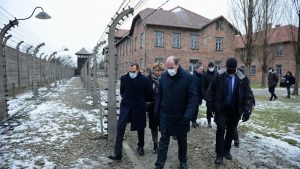 The head of French government, on the occasion of the 77th anniversary of the liberation of the Nazi camps, assured of the “permanent fight” of the French Republic against anti-Semitism. Prime Minister Jean Castex reaffirmed on Thursday France’s “fight” against anti-Semitism, but also against those who “distort the history” of the Holocaust, on the occasion of the 77th anniversary of the liberation of the Nazi camps in ‘Auschwitz-Birkenau with survivors, college and high school students. Ten weeks before the French presidential election, and as memorial debates permeate the news, it was obvious that the visit of the Prime Minister, two years after that of his predecessor Edouard Philippe, would take a political turn. And the most direct message came from an Auschwitz survivor, surgeon Elie Buzyn, now 93, who strongly warned the handful of teenagers present in the delegation against “political extremism, on the right and to the left “.
The head of French government, on the occasion of the 77th anniversary of the liberation of the Nazi camps, assured of the “permanent fight” of the French Republic against anti-Semitism. Prime Minister Jean Castex reaffirmed on Thursday France’s “fight” against anti-Semitism, but also against those who “distort the history” of the Holocaust, on the occasion of the 77th anniversary of the liberation of the Nazi camps in ‘Auschwitz-Birkenau with survivors, college and high school students. Ten weeks before the French presidential election, and as memorial debates permeate the news, it was obvious that the visit of the Prime Minister, two years after that of his predecessor Edouard Philippe, would take a political turn. And the most direct message came from an Auschwitz survivor, surgeon Elie Buzyn, now 93, who strongly warned the handful of teenagers present in the delegation against “political extremism, on the right and to the left “.
“As we are on the eve of the elections, I remind you that in 1933, Chancellor Hitler came to power after completely democratic elections”, launched the father of the former Minister of Health. “So you have to think carefully before going to vote,” he further urged the young winners of the National Resistance and Deportation Competition. “The French Republic remains more vigilant than ever”. Previously, in a casual exchange with Jean Castex and Dijon high school students during the lunch break, Agnès Buzyn had moved the audience by recounting her arrival with her parents and her sister in Birkenau, when “two deportees were approached” and told him to conceal his real age – 15 at the time – to say that he was 17. A piece of advice which had allowed him to cross the macabre selection made as soon as he got off the train by the German Nazi staff of the camp, like what “life sometimes depends on a word”. “Otherwise I would have gone up in smoke in 1944,” he slipped to the teenagers hanging on to his story. After having traveled under a low sky, in the cold and the melted snow, the immense camp of Birkenau, then visited the brick barracks of Auschwitz and carried out the ritual gestures of memory, Jean Castex also distilled messages. Because the climate is worrying: a study by Ifop, published Wednesday in Le Parisien, showed that 85% of French Jews, and 64% of the general population, believe that anti-Semitism is a widespread feeling in France. . And more broadly, acts with anti-Semitic motives reached their highest level in ten years in 2021 with more than ten incidents per day worldwide, according to a report published Monday by the Jewish Agency and the World Zionist Organization. In this context, “the French Republic, in a permanent and absolutely determined fight against anti-Semitism, remains more vigilant than ever. It deploys and will deploy all the necessary means to fight it, ”said the Prime Minister. “This historical and political debate is settled” In a small committee, Jean Castex also castigated those who question the responsibility of the French State in the deportation,in allusion to the words of the far-right candidate Eric Zemmour, who sees in Marshal Philippe Pétain a “savior” of the Jews. “This historical and political debate is settled”, swept the head of government. “Afterwards you always have people who dispute”, “distort history”, and “we must fight them with the last energy”, pleaded Jean Castex. “It’s a legal fight, but it’s first of all a political, ideological fight, a vision of society and humanity”, insisted Jean Castex. Stressing that revisionism had always existed (“the envelope changes but not the substance”), Jean Castex also wanted to “recall what these political postures can lead to”. “It always ends badly,” he warned. Presenting Jean Castex with a room in the French pavilion of Auschwitz, in which he exhibits a thousand photos of murdered children, the lawyer Serge Klarsfeld, whose father Arno was also killed in Auschwitz, drove the point home in front of the teenagers: “the Vichy regime must be condemned forever”. The Auschwitz-Birkenau camp, located in southeastern Poland then occupied by Adolf Hitler’s Third Reich Nazis, operated between June 1940 and January 1945. Some 1.1 million people, including a huge majority of Jews from different European countries perished there, exterminated in gas chambers or died of starvation and exhaustion. He was liberated by the Red Army on January 27, 1945
